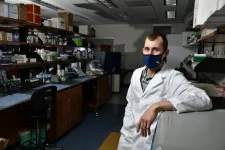Elephant seals' extreme diving allows them to exploit deep ocean niche
Forced into an ecological corner: Round-the-clock deep foraging on small prey by elephant seals
2021-05-12
(Press-News.org) Elephant Seals' Extreme Diving Allows Them to Exploit Deep Ocean Niche
Using data captured by video cameras and smart accelerometers attached to female elephant seals, Taiki Adachi and colleagues show that the animals spend at least 80% of their day foraging for fish, feeding between 1,000 and 2,000 times per day. The unique glimpse at elephant seal foraging strategy shows how these large marine mammals exploit a unique ocean niche filled with small fish. The findings also may offer a way to monitor the health of the mesopelagic zone, the dark and cold ocean "twilight zone" ecosystem at 200 to 1,000 meters deep. Small mesopelagic fish dominate the world's ocean biomass, but little is known about the mesopelagic zone or how it is affected by global climate change. Large marine mammals can dive deep to find food in this zone, but the bigger they are, the more food they need to sustain themselves. Massive marine mammals like sperm whale solve this problem by diving into the mesopelagic zone to eat large prey like jumbo squid. The data collected by Adachi et al. suggest that the smaller elephant seals solve the problem by eating abundant small mesopelagic fish, but the smaller mouthfuls mean they must dive repeatedly to maintain a positive energy balance. The researchers say that elephant seal foraging activity could be used to trace the future health of mesopelagic fish populations, as the mesopelagic zone is expected to undergo substantial changes in temperature and oxygenation by the end of the century.
INFORMATION:
ELSE PRESS RELEASES FROM THIS DATE:
2021-05-12
A Johns Hopkins University-led team has created an inexpensive portable device and cellphone app to diagnose gonorrhea in less than 15 minutes and determine if a particular strain will respond to frontline antibiotics.
The invention improves on traditional testing in hospital laboratories and clinics, which typically takes up to a week to deliver results--time during which patients can unknowingly spread their infections. The team's results appear today in Science Translational Medicine.
"Our portable, inexpensive testing platform has the potential to change the game when it comes to diagnosing and enabling rapid treatment of sexually transmitted infections," said team leader Tza-Huei Wang, a professor of mechanical engineering ...
2021-05-12
People who are genetically more likely to suffer from cardiovascular diseases may benefit from boosting a biomarker found in fish oils, a new study suggests.
In a genetic study in 1,886 Asian Indians published in PLOS ONE today (Wednesday 12 May), scientists have identified the first evidence for the role of adiponectin, an obesity-related biomarker, in the association between a genetic variation called omentin and cardiometabolic health.
The team, led by Professor Vimal Karani from the University of Reading, observed that the role of adiponectin was linked to cardiovascular disease markers that were independent of common and central obesity among the Asian Indian population. ...
2021-05-12
Misleading claims about COVID-19 vaccines can negatively impact public confidence in immunisation uptake, a new UNSW Sydney study reveals.
A new study published in the scientific journal PLOS ONE revealed over 103 million people globally liked, shared, retweeted or reacted with an emoji to misinformation and conspiracy theories about COVID-19 vaccines.
In 2020, a social media post claiming, "a new vaccine for COVID-19 will alter a person's DNA and result in them becoming genetically modified" was circulated on Facebook accounts in Australia. Up until August 21, 2020, this false claim had attracted 360 shares and was viewed 32,000 times.
The study, led by UNSW researchers, ...
2021-05-12
Quick: Pick your three favorite fast-food restaurants.
If you're like many people, McDonald's, Wendy's, and Burger King may come to mind--even if you much prefer In-N-Out or Chick-fil-A.
A new study from UC Berkeley's Haas School of Business and UC San Francisco's Department of Neurology found that when it comes to making choices, we surprisingly often forget about the things we like best and are swayed by what we remember. The paper, publishing this week in the journal Proceedings of the National Academy of Sciences, combines insights from economics and psychology with decision-making experiments and fMRI brain scans to examine how our imperfect memories affect our decision making.
"Life is not a multiple-choice test," says Berkeley ...
2021-05-12
Autoimmune diseases have something in common with horses, bachelor's degrees and daily flossing habits: women are more likely to have them.
One reason for autoimmune diseases' prevalence in women may be sex-based differences in inflammation. In a new study, West Virginia University researcher Jonathan Busada investigated how sex hormones affect stomach inflammation in males and females. He found that androgens--or male sex hormones--may help to keep stomach inflammation in check.
"Stomach cancer is primarily caused by rampant inflammation," said Busada, an assistant professor in the School of ...
2021-05-12
Brown bears that are more inclined to grate and rub against trees have more offspring and more mates, according to a University of Alberta study. The results suggest there might be a fitness component to the poorly understood behaviour.
"As far as we know, all bears do this dance, rubbing their back up against the trees, stomping the feet and leaving behind odours of who they are, what they are, what position they're in, and possibly whether they are related," said Mark Boyce, an ecologist in the Department of Biological Sciences.
"What we were able to show is that both males and females have more offspring if they rub, more surviving offspring if they rub and they have more mates if they rub."
The research team led by Boyce ...
2021-05-12
Citrus greening disease was first discovered in Florida in 2005. Since then, production of oranges in the United States for processing has declined by 72 percent between the 2007-2008 growing season and the 2017-2018 growing season, primarily in Florida. The disease was discovered in California in 2012, and now the state is beginning to see a rapid increase of citrus greening disease.
As there is currently no cure for citrus greening disease, many growers are concerned about its rapid spread and many plant pathologists are focused on learning more about the complicated nature of this disease. To add to this growing body of knowledge about citrus greening disease, a group of scientists working in California, ...
2021-05-12
Annually, more than 350,000 children in the world are affected by pediatric cancer. Radiation has improved outcomes dramatically, but the damage caused to healthy tissue can affect the long-term health of a child. While clinicians and radiation specialists design treatments using the most up-to-date information available, there hasn't been a single guiding source of data to make evidence-based decisions that are specific for children. Now, a volunteer international research collaboration is working toward providing evidence-based guidelines for radiation therapy dosing for children. Results from this effort will help in minimizing side effects while continuing to provide ...
2021-05-12
LA JOLLA, CA--Scientists at Scripps Research have unveiled a new Ebola virus vaccine design, which they say has several advantages over standard vaccine approaches for Ebola and related viruses that continue to threaten global health.
In the new design, described in a paper in Nature Communications, copies of the Ebola virus outer spike protein, known as the glycoprotein, are tethered to the surface of a spherical carrier particle. The resulting structure resembles the spherical appearance of common RNA viruses that infect humans--and is starkly different from the snake-like shape of the Ebola virus.
The scientists say the design is intended to stimulate a better protective immune response than standard vaccine approaches, ...
2021-05-12
New Brunswick, N.J. (May 12, 2021) - A Rutgers study finds that symbiotic bacteria that colonize root cells may be managed to produce hardier crops that need less fertilizer.
The study appears in the journal Microorganisms.
Bacteria stimulate root hair growth in all plants that form root hairs, so the researchers examined the chemical interactions between bacteria inside root cells and the root cell.
They found that bacteria are carried in seeds and absorbed from soils, then taken into root cells where the bacteria produce ethylene, a plant growth hormone that ...
LAST 30 PRESS RELEASES:
[Press-News.org] Elephant seals' extreme diving allows them to exploit deep ocean niche
Forced into an ecological corner: Round-the-clock deep foraging on small prey by elephant seals

